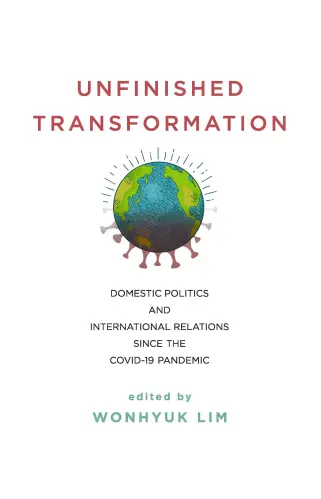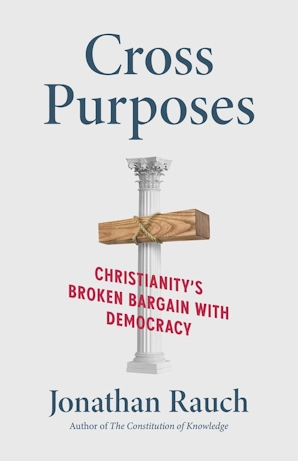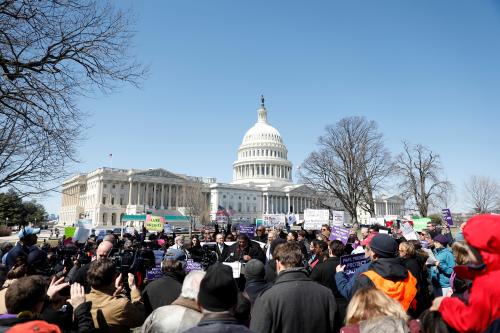Editor’s Note:
This analysis is part of The Leonard D. Schaeffer Initiative for Innovation in Health Policy, which is a partnership between the Center for Health Policy at Brookings and the USC Schaeffer Center for Health Policy & Economics. The Initiative aims to inform the national health care debate with rigorous, evidence-based analysis leading to practical recommendations using the collaborative strengths of USC and Brookings.
Now that Congressional efforts to repeal or replace the Affordable Care Act (ACA) have abated, the 18 states that have not expanded Medicaid can consider whether to do so going forward. The ACA’s established funding will pay for 90 percent of the costs of expanding Medicaid to cover people in households with incomes at or below 138 percent of the federal poverty level. Previously, these 18 states declined to expand, in part because of concerns about their ability to predict and afford their 10 percent share of the costs.
With the ACA in its fifth year of full expansion, we now have an established track record in the expanding states to help estimate what the actual costs of expansion will be to the states and how those costs have compared to states’ projections. This Issue Brief reviews that evidence, and evaluates continuing claims by Medicaid opponents that expansion is a “proven disaster” for state budgets. The strong balance of objective evidence indicates that actual costs to states so far from expanding Medicaid are negligible or minor, and that states across the political spectrum do not regret their decisions to expand Medicaid.
Are Opposition Claims Accurate?
Claims that the costs of Medicaid expansion have far exceeded expectations are overstated, misleading, and substantially inaccurate, based on a review of the credible evidence from either academic or government sources. The primary basis of this claim is the fact that many expansion states have enrolled more people than they initially expected. However, because the federal government pays for most of their costs, this increased enrollment has not translated into large percentage increases in states’ Medicaid budgets.
To the contrary, the leading peer-reviewed, academic study on this question documented, based on comprehensive data from the National Association of State Budget Officers that, by 2015, “there were no significant increases in spending from state funds as a result of the expansion.” Although states will start to incur some costs in years following 2015 as their 10 percent funding requirement is phased in, several expert analysts predict that those costs are likely to remain modest, despite increased enrollment.
One reason new enrollees do not substantially burden states’ Medicaid budgets is that expansion absorbs some of the costs states were already bearing prior to expansion. Various categories of previously covered Medicaid recipients (such as “presumptive” enrollees) can now enroll under the ACA’s expansion program, such that, according to federal (CMS) data, over 20 percent of expansion enrollees were not “newly eligible.” This shift in enrollment reduces the state’s share of their Medicaid expenses. Also, expanded Medicaid pays for various costs that states previously were absorbing outside of Medicaid. Accordingly, several credible and expert evaluations (including one in the New England Journal of Medicine) show that states such as Arkansas, Indiana, Kentucky, Louisiana, Michigan, Montana, New Mexico, Ohio, and West Virginia (among others) have actually reduced, not increased, state spending as a result of expansion.
There are reasons to question the accuracy or objectivity of the contrary evidence presented by some expansion opponents. Perhaps the leading source is the ultra-conservative Foundation for Government Accountability, which (according to journalist and academic reports) campaigns aggressively against Medicaid expansion across the country. Various credible and respected sources (including a federal judge, a Pulitzer prize journalist, and both liberal and conservative legislators and analysts) have concluded that it produces and disseminates information and analysis that, based on “even a cursory review,” is “not competent,” “bogus,” “highly misleading,” “fundamentally flawed,” “oversimplistic and exaggerated,” “absurd,” “a parade of alternative facts designed to obscure the simple truth,” “misrepresents or omits data,” and presents “a myriad of misleading and irresponsible statements.”
Contradicting this source’s claim that “each and every state that opted into ObamaCare expansion is facing a surge in Medicaid enrollment far higher than ever anticipated,” officials or agencies from Indiana, North Dakota, and Ohio (here and here) have flatly stated (and documented) that expansion enrollment, or overall enrollment, has either fallen short of, or not substantially exceeded, expectations. Moreover, the comprehensive, peer-reviewed study noted above documented that “States’ advance budget projections were reasonably accurate in the aggregate, with no significant differences between the projected levels of federal, state, and Medicaid spending and the actual expenses as measured at the end of the [2015] fiscal year.”
Will Expanding States Come to Regret their Decision?
Going beyond disputes about what the economic record shows, we can also look to the felt experience in states that have expanded – whether blue, red or “purple.” Contradicting claims that expansion states now regret their decisions, Republican governors in at least five expansion states (Arkansas, Arizona, Michigan, Nevada, Ohio) have voiced their continuing support for expansion, and several openly opposed recent Congressional efforts to repeal expansion. Likewise, Republican-led legislative bodies in several states (Arkansas, North Dakota, New Hampshire) have ratified or reauthorized their state’s initial expansion. And, none of the states that had legislative “triggers,” allowing them to roll back or reconsider expansion if projected costs turn out to be seriously wrong, have felt the need to pull the plug on expansion.
Contrary evidence from opponents suggesting official regret comes from expansions that occurred prior to the ACA, when the states bore a much greater share of expansion costs. Not only is the ACA deal much sweeter for states than before, the Trump administration has now increased the flexibility for states to add elements in their expansion programs that will help to better control costs going forward, such as patient cost-sharing.
Under the ACA, several additional factors mitigate the potential for regret from expanding Medicaid now. First, the actual track record from ACA expansion is now fairly well-established, so revised estimates and projections should be much more accurate than five years ago, when there were many more unknowns about the ACA as a whole.
For instance, one large unknown was how much new enrollees would cost. Initially, states expected more “pent up demand” for delayed care than they actually experienced, and thus they paid Medicaid managed care organizations (MCOs) substantially more than was necessary. These excess capitation payments produced an initial jump in costs, but the government subsequently recouped almost $9 billion of that excess through contractual provisions with their Medicaid MCOs, and the federal government now estimates that per person costs for newly eligible recipients will decrease almost 20 percent from their 2015 payment levels. Newly expanding states will be able to contract based on this more solid actuarial data, and can learn from the contracting techniques piloted by other states.
Also unknown at first was the extent of the ACA’s “woodwork” or “welcome mat” effect, by which previously eligible people decided to enroll based on publicity around the ACA and the greater ease of enrollment through its navigation programs and online platforms. By now, the woodwork/welcome mat effect has largely run its course, so cost increases that expanding states initially felt due to this effect have already been absorbed in the budgets of non-expanding states.
Conclusion
Drawing from all of the above, claims are not well founded that Medicaid expansion will cost states considerably more than what objective analysts project. Instead, those claims are based on sources that are either incomplete, inaccurate, misleading, or out of date in various ways. Although it is unlikely that Medicaid expansion will turn out to be entirely free to states, based on the considerable experience to date, the probable costs appear to be quite low in comparison with the economic and public health benefits of expansion.
The author did not receive financial support from any firm or person for this article or from any firm or person with a financial or political interest in this article. He is currently not an officer, director, or board member of any organization with an interest in this article.
The Brookings Institution is committed to quality, independence, and impact.
We are supported by a diverse array of funders. In line with our values and policies, each Brookings publication represents the sole views of its author(s).









Commentary
Do states regret expanding Medicaid?
March 26, 2018